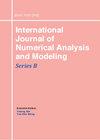基于模糊神经网络的非线性系统辨识分数阶学习方法
IF 0.7
4区 数学
Q1 MATHEMATICS
International Journal of Numerical Analysis and Modeling
Pub Date : 2023-06-01
DOI:10.4208/ijnam2023-1031
引用次数: 0
摘要
本文章由计算机程序翻译,如有差异,请以英文原文为准。
Fractional Order Learning Methods for Nonlinear System Identification Based on Fuzzy Neural Network
. This paper focuses on neural network-based learning methods for identifying nonlinear dynamic systems. The Takagi-Sugeno (T-S) fuzzy model is introduced to represent nonlinear systems in a linear way. Fractional calculus is integrated to minimize the cost function, yielding a fractional-order learning algorithm that can derive optimal parameters in the T-S fuzzy model. The proposed algorithm is evaluated by comparing it with an integer-order method for identifying numerical nonlinear systems and a water quality system. Both evaluations demonstrate that the proposed algorithm can e(cid:11)ectively reduce errors and improve model accuracy.
求助全文
通过发布文献求助,成功后即可免费获取论文全文。
去求助
来源期刊
CiteScore
2.10
自引率
9.10%
发文量
1
审稿时长
6-12 weeks
期刊介绍:
The journal is directed to the broad spectrum of researchers in numerical methods throughout science and engineering, and publishes high quality original papers in all fields of numerical analysis and mathematical modeling including: numerical differential equations, scientific computing, linear algebra, control, optimization, and related areas of engineering and scientific applications. The journal welcomes the contribution of original developments of numerical methods, mathematical analysis leading to better understanding of the existing algorithms, and applications of numerical techniques to real engineering and scientific problems. Rigorous studies of the convergence of algorithms, their accuracy and stability, and their computational complexity are appropriate for this journal. Papers addressing new numerical algorithms and techniques, demonstrating the potential of some novel ideas, describing experiments involving new models and simulations for practical problems are also suitable topics for the journal. The journal welcomes survey articles which summarize state of art knowledge and present open problems of particular numerical techniques and mathematical models.

 求助内容:
求助内容: 应助结果提醒方式:
应助结果提醒方式:


